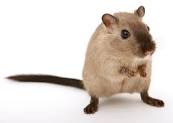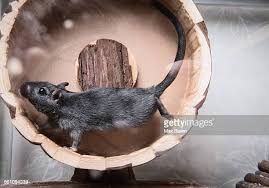Soothe Your Inner Gerbil
by Bob Buddemeier
Reader beware! The author has no formal credentials in the fields of psychology, physiology, or life management, but decades of personal experience with confusion, indecisiveness, procrastination and wide-ranging dysfunction have convinced him that he is qualified to experiment and advise on those subjects. Use at your own risk!
Do you ever feel like your brain consists of a multitude of gerbils, all running at top speed on their exercise wheels with no net progress whatsoever? I do, and after protracted research and reflection I have come to understand why, and what to do about it. And I am going to share that with you.

calm but alert gerbil
The secret: If it acts like a gerbil, treat it like a gerbil! Unfortunately, the rodent model of human cognition has received far too little popular attention. Herewith, a brief description to facilitate effective interactions.
First, forget about the scientific jargon involving neurons, synapses, etc. Your nervous system is a nation of teeny tiny gerbils, organized into interconnected communities according to their occupational specialties. When the system is well-supported and operating smoothly, it produces a high GEP (Gerbil Economic Product) for export to you.
There are Collector Gerbils who receive and import resources from the Outside (e.g, sounds, sights, smells, etc.) and transform them into what we can think of as kibble. A wide range of kibble of different shapes, sizes, colors, tastes, and digestibility. These they pass on to the Sorter Gerbils.
Sorters have limited autonomy; they can pass certain kinds of kibble directly to the appropriate specialists, but mostly they are guided by the decisions of a committee of Silverback Gerbils, who oversee the distribution of inputs in order to maintain the GEP.

Team Gerbil, ready for project
Usually things work smoothly, but sometimes the input causes the Collectors to produce an imbalance of kibble types, including too much poorly digestible kibble that takes a long time to process. Then the Sorters are passing too many bits to the Emergency Response Gerbils, and becoming frustrated by the overload and unbalanced inventory.
The Silverbacks, faced with multiple unaccustomed problems, fall to arguing among themselves and fail to instruct the sorters. As a result, the communities receive a downpour of poorly sorted kibble that overwhelms their infrastructure and does not provide the necessary resources. The communities of Producer Gerbils fragment within, and try to raid other communities for the necessary resources. Order breaks down, and GAF (Gerbil Adrenaline Flow) spikes – sometimes dangerously. This condition is known as Non-Selective Overload (NSO).
What then? Every gerbil has access to an exercise wheel, individual or communal. Under normal conditions an appropriate amount

Stressed gerbil working out
of well-timed exercise keeps the individual and community functioning. When overload builds up, the gerbils instinctively try to burn up their GAF by exercising harder and longer on the wheel, sometimes skipping work to do so. Productivity goes down.
When full-blown NSO is occurring, the gerbils become almost demonically hyperactive; they leap on their wheels and dash frenziedly “forward” in a glazed-eye, mouth-foaming sprint. Both gerbils and wheels squeak and chatter loudly, and of course GEP plummets. You can’t help but notice this – often acutely.

Ultimate Overload
Dealing with NSO – the solution to the problem of getting your gerbils back to work is, somewhat counterintuitively, a different kind of overload. Ultra-Selective Overload (USO) is a technique for replacing the distractingly diverse and unbalanced input of NSO with a surfeit of a very few kinds of attractive and enjoyable input. The gerbils are made happy by what they get, realize that production is impossible, and subside into mellow passivity. GEP remains very low, but it is essential to recognize this as a necessary period of recovery that will result in a quicker return to normal behavior.
Providing Ultra-Selective Overload: Control of the material that the Collector Gerbils can access is one of the most effective means of getting to USO. One possibility is total shutdown – essentially, starving the communities into submission. Unfortunately, the starting point almost always involves large existing stocks of poorly digestible kibble that keep the communities operating poorly and unhappily.

Recovering gerbil
So — and here comes the advice – we need to pick out a few Collectors and feed them input that will produce lots of kibble with pleasantly hypnotic qualities. It has to be sustainable; the gerbils do not calm down and get off their wheels immediately — they need to be coaxed into resting mode over time. Taste, smell and touch are hard to sustain; sight and sound are the obvious choices for kibble raw material in our era of technologically augmented input.
HOW TO: Let’s acknowledge that natural may be best – although peripheral inputs may distract, real-world floating clouds, fluttering leaves, and flowing water can do the job. But that means you have to find a desirable environment where you can hang out any time, and more or less indefinitely. Realistically, you may need to soothe your gerbils at night, or in bad weather, or in the middle of a city. Then —

Completely soothed gerbils
We use our smart TV, computer, or maybe cell phone (but screen and speakers are pretty small). Some of the things that my gerbils respond to can be seen or downloaded by clicking on https://thecomplement.info/wp-content/uploads/2023/06/Soothing-methods.pdf. Yours may be different, but there are many sources offering various alternatives. For simplicity, my examples are accessible on Youtube, which can be accessed free from any computer/phone browser with an internet connection, and from most if not all smart TVs.
So check them out. Get a feeling for what might work before the furry little rascals slide all the way into anarchy. Once you have taken the initial steps into gerbil control, you will find that you are better positioned to start adjusting the community diet as soon as the first few wheels start squeaking. Remember, if you look after your Inner Gerbils, they will look after you.


Leave a Reply
Want to join the discussion?Feel free to contribute!